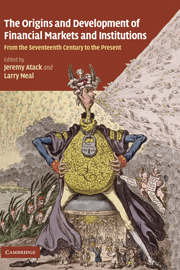 The Origins and Development of Financial Markets and Institutions
The Origins and Development of Financial Markets and Institutions Published online by Cambridge University Press: 04 August 2010
From 1715 to 1720, a Scotsman named John Law undertook a radical restructuring of French public finances. Because the entire operation appeared to be based on rational principles, it has been called in the French historiography Law's Système. In the English-language historiography, it is perhaps better known as the Mississippi Bubble, because an essential element of the scheme was the issue of shares in a trading company, whose prices rose prodigiously in a short period of time and then collapsed.
It is one of Larry Neal's achievements to have placed this bubble in the European context of 1720, tracing the links it had with near-simultaneous bubbles in London and Amsterdam. I wish to revisit the question posed by the title, in the light of more recent work on John Law and my ongoing research. In doing so, I will adopt a narrower approach, focusing essentially on the purely French aspect of the question.
The bubble, or more precisely the rise in the price of the shares of Law's company, were but a cog in the vast operation that Law planned, or at any rate carried out (how much it was planned remains debatable), radically to transform French public finances. I will argue that the market whose prices we observe was managed, if not manipulated. Law ultimately had a target for his share price, partly motivated by misconceptions on the effect of monetary expansion on the interest rate, and therefore on the discount rate; partly motivated by the need to maintain the forward momentum of his operation.
To save this book to your Kindle, first ensure [email protected] is added to your Approved Personal Document E-mail List under your Personal Document Settings on the Manage Your Content and Devices page of your Amazon account. Then enter the ‘name’ part of your Kindle email address below. Find out more about saving to your Kindle.
Note you can select to save to either the @free.kindle.com or @kindle.com variations. ‘@free.kindle.com’ emails are free but can only be saved to your device when it is connected to wi-fi. ‘@kindle.com’ emails can be delivered even when you are not connected to wi-fi, but note that service fees apply.
Find out more about the Kindle Personal Document Service.
To save content items to your account, please confirm that you agree to abide by our usage policies. If this is the first time you use this feature, you will be asked to authorise Cambridge Core to connect with your account. Find out more about saving content to Dropbox.
To save content items to your account, please confirm that you agree to abide by our usage policies. If this is the first time you use this feature, you will be asked to authorise Cambridge Core to connect with your account. Find out more about saving content to Google Drive.